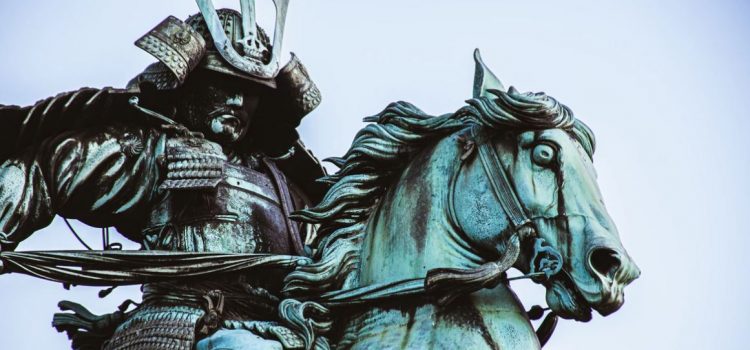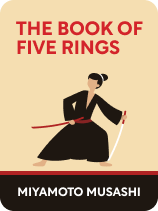

This article is an excerpt from the Shortform book guide to "The Book of Five Rings" by Miyamoto Musashi. Shortform has the world's best summaries and analyses of books you should be reading.
Like this article? Sign up for a free trial here .
What is a samurai mindset? What are the key qualities of a samurai warrior?
In his 1643 book The Book of Five Rings, Miyamoto Musashi says that you can’t become an expert swordsman if you don’t have the right mindset. He details important qualities that any aspiring samurai should cultivate such as honesty, perception, and purpose.
Here’s how to cultivate a samurai mindset, according to Miyamoto Musashi.
Cultivate a Samurai Mindset
While Mushashi emphasizes the importance of developing a deep knowledge of the warrior’s art first and foremost, he also argues that in order to apply this knowledge effectively, the warrior must develop flexibility of mind, a samurai mindset. Flexibility of mind depends on the following habits:
- Applying your knowledge and skills within different contexts. Musashi warns against getting too comfortable with, or reliant upon, one particular setting when waging combat. The true warrior needs to know how to use his skills and knowledge equally well regardless of circumstances. Musashi also reminds his reader that “real world” applications of knowledge can look very different from the “textbook” treatment—this is why the warrior needs to be prepared to deal with any eventuality.
| Identify and Use Your Transferable Skills Musashi’s advice to avoid becoming dependent on particular conditions or settings in order to succeed applies to today’s continuously evolving workplace. Transferable skills are becoming increasingly valuable, especially since the number of workers looking to switch their roles or industries has risen dramatically. An article by Forbes even argues that workers who switch jobs frequently may be more successful in the long run than those who remain within the same role or company long term. With this in mind, it’s important to identify your transferable skills and how you could apply them within a new role or industry. Begin by making a three-columned chart to help organize your experiences and what you have gained from them. In the first column, write down an experience or responsibility you have had. In the second column, list the qualities or skills the experience required. In the third column, identify which of those qualities or skills could be transferred to a different role or situation. For additional help in identifying your transferable skills: -Ask a friend or mentor which skills or abilities they think you have. Ask them to provide examples of when you demonstrated those skills. -Review your CV. What key words or terms do you keep mentioning, e.g. reliable, attention to detail, interpersonal skills? -Consult a transferable skills checklist, many of which are freely available online to help get you brainstorming. |
- Paying attention to the smallest things as well as the biggest things. True knowledge lies in knowing everything of relevance, no matter how minor it may seem. Musashi makes several cryptic comments about how what is small is large, and what is large is small. One interpretation could be that “small” and “large” are often matters of perspective: What might be a minor factor in one situation could be a much more crucial factor in another, depending on circumstances.
| Dealing With Details More Effectively Learning how to become more detail-oriented and better at spotting the little things that matter takes time and practice. You can learn how to be more detail-oriented at work—for example, by reading instructions carefully, taking time to check over work before submitting it, and finding ways to break big goals down into smaller steps. However, while Musashi argues that everything is relevant in some way, be it large or small, this is not always practical today. Learning how to prioritize is crucial for time management and effective goal-setting, and this means learning how to separate what is important or relevant from what is less so. The analogy of rocks, pebbles, and sand can be useful in learning how to sort out tasks and details in order of importance. The analogy works by showing how fitting all of the rocks, pebbles, and sand in a jar is a matter of knowing which to add first and in what order. If you prioritize the wrong material, not everything will fit in the jar. |
- Recognizing that small things can become more dangerous or important than things that appear larger, especially since small things are so easy to overlook or underestimate. Musashi uses the example of a large group of enemies compared to an individual one. While the large group might appear more threatening, it is nevertheless easy to spot, and a large group of combatants can’t change their position easily. An individual warrior, by contrast, is harder to spot, more nimble, and therefore more unpredictable. In this respect, an individual warrior can be more dangerous than many fighters working collectively.
| Guerrilla Warfare: The Danger of Small Threats Musashi’s warning about an agile enemy or small force being sometimes more dangerous than a large army has particular relevance in recent history. In the latter half of the 20th century, guerrilla warfare became a particularly successful strategy used by small, under-equipped forces against much larger and more powerful armies. Some notable examples include: The Viet Cong Communist forces that waged guerrilla warfare against the US during the Vietnam War (1954-75). Although the US boasted one of the most powerful military forces in the world after WWII, the unrelenting guerrilla tactics of the Viet Cong led to the US spending enormous amounts of time, money, and personnel in Vietnam over nearly two decades, ultimately to no avail. Fidel Castro ultimately seized power in Cuba from former President Fulgencio Batista, after starting out with just a small band of guerrilla fighters during the Cuban Revolution (1953-59). Over roughly five years, Castro and his guerrillas used stealth, strategic military strikes, and constant movement throughout the Cuban countryside to harass the regime and slowly amass popular support for their cause. Portugal lost the last territories of its former global empire after costly, protracted warfare against guerrillas in its African colonies. In colonies such as Angola and Mozambique, nationalist guerrilla fighters waged relentless campaigns against the Portuguese colonial forces from 1961 until 1974. The Colonial Wars became so unpopular in Portugal that they led to both the overthrow of Portugal’s Estado Novo dictatorship and the liberation of the African colonies in 1974. |
Develop Patience and Commitment
Musashi consistently emphasizes that developing mastery in any discipline takes a great deal of time and perseverance. His three main strategies for nurturing resilience and commitment are:
- Recognize that beginnings are always difficult. Just because something is hard to do now doesn’t mean that it will always be difficult. Musashi uses examples of various weapons to illustrate this point—no weapon is easy to wield at first, he points out. Over time, difficult tasks will become easier.
| Build Your Resilience Developing resilience and a determined attitude toward achieving your goals are learnable with the right methods and mindset. Here are some tips for boosting your resilience: Get enough sleep. Chronic sleep deprivation can lead to irritability, lack of focus, and less emotional control, all of which can impact your level of resilience. Keep a consistent sleep schedule by going to bed and waking up at set times every day. Manage your stress levels. Feeling overwhelmed can make it harder to face challenges. You can learn how to cope with stress to help build resilience under pressure. Set specific and realistic goals. If you don’t know what you want to achieve, it can be harder to maintain momentum. Follow the SMART goal principle, setting goals that are: Specific, Measurable, Attainable, Realistic, and Timely. Set a mix of both short-term and long-term goals so you can see how you are working toward larger objectives step-by-step. Seek support. Maintain emotional balance by reaching out to family, friends, and professional mentors whenever you need encouragement and advice. Sometimes resilience is a team effort. |
- Undergo constant training. Musashi writes about how he spent many long years completely absorbed in learning about his art and training himself in it. He expects the same of any other aspiring warrior. He repeatedly stresses how crucial it is to commit yourself to rigorous, constant training in order to develop true mastery in your chosen discipline.
| The Importance of “Deliberate Practice” Habits coach James Clear advocates for “deliberate practice” when adopting new skills and pursuing goals. Deliberate practice is rooted in the idea that effective practice is, above all, focused practice: You give your full attention to what you are doing, and seek to understand and perfect it. Because you’re applying sustained focus to the skill or habit you’re trying to develop, you’ll be able to spot your errors more easily and correct them. Clear argues that deliberate practice applies to any discipline, giving examples of success stories from fields as varied as cooking, writing, music, and sports. This idea of deliberate practice is reminiscent of Musashi’s urging of constant, focused training, especially since Musashi considers deeply meditating upon each principle before practicing it to be a part of the process. Musashi wants the ideal warrior to learn and practice everything mindfully—or, as James Clear would say, deliberately. |
- Have an all-or-nothing attitude toward victory. Musashi describes “the spirit of winning” as being absolutely committed to achieving your goal. He says that the warrior must be prepared to use any weapon and to deal with any obstacle. A singular focus on victory is essential.
| Counterpoint: Sun Tzu Argues Against “Total” Victory Musashi’s attitude to victory is single-minded: Only winning matters, and completely subduing—or in the case of Samurai combat, killing—your enemy is the only victory worth having. Sun Tzu, by contrast, takes the opposite approach. In Book III of The Art of War, he argues that total warfare is not always good or necessary. Instead, Tzu advocates the route of least possible damage: Kill as few of the enemy as possible, destroy as little of their lands and property as possible. He even claims that the highest form of military skill is gaining victory over your enemy without having to fight at all. Instead, you can thwart the enemy’s plans and rout him through your knowledge and superior strategy alone. Furthermore, Tzu doesn’t share Musashi’s admiration for smaller forces that gain impressive victories over larger forces—Tzu advises avoiding such uneven matches in the first place, preferring to always be superior or equal to the enemy’s forces. If your forces are smaller in number, Tzu’s advice is unequivocal—avoid, or retreat. The main difference between Musashi’s and Tzu’s approaches becomes readily apparent in such passages: Musashi’s Way embodies the grandeur and stylized violence of Samurai culture, while Tzu’s “arts of war” are more pragmatic. |
Musashi’s 9 Principles
At the end of the Ground Book, Musashi lists nine general principles for warriors wishing to learn the Way and adopt a samurai mindset. These principles are:
- Be honest.
- Train constantly.
- Familiarize yourself with other arts.
- Develop knowledge of other professions.
- Learn to tell the difference between true loss and gain.
- Develop intuitive judgment and understanding for everything.
- Have perception as well as sight.
- Be detail-oriented.
- Be purposeful.
(Shortform note: Musashi doesn’t elaborate on these principles, or give specific advice on how or when the warrior can apply them during or after training. However, some of these principles reflect the qualities that Musashi urges the warrior to have elsewhere in the text: a total commitment to learning, iron discipline in training, the development of both perception and sight, and paying equal attention to small things as well as large. As with so much of Musashi’s approach in The Book of Five Rings, it is up to the warrior (or student) to meditate upon these principles and to learn how best to apply them in his own life.)
| Saitō Chikamori’s Samurai Principles In 1642, Musashi’s contemporary and fellow Samurai, Saitō Chikamori (1603-1674) wrote a work called the Kashoki in which he listed a code of ethics for Samurai built upon principles that echo but also differ from Musashi’s: Sincerity: Never lie, and don’t be insincere or superficial. Serve with dignity: Don’t flatter or behave in a sycophantic manner. Frugality: Avoid being greedy. Politeness: Never slander or be rude to others. Modesty: Avoid being boastful or arrogant. Loyalty: Be faithful. Harmony: Be civil to others. Tranquility: Accept what happens with a calm mind. Compassion: Be compassionate and dutiful toward others. While Chikamori and Musashi agree on the importance of sincerity (Musashi’s “Be honest”) and tranquility in the face of external events (similar to Musashi’s “Learn to tell the difference between true loss and gain”), Chikamori’s principles are more openly concerned with moral virtues than training and knowledge, which are Musashi’s recurring focus. |

———End of Preview———
Like what you just read? Read the rest of the world's best book summary and analysis of Miyamoto Musashi's "The Book of Five Rings" at Shortform .
Here's what you'll find in our full The Book of Five Rings summary :
- Insights from the famous Samurai Miyamoto Musashi about the Way of the Warrior
- How to apply Musashi’s teachings to your personal and professional lives
- Why success is not based on brute strength or innate talent






